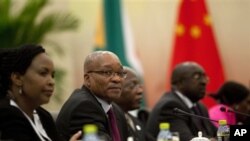Leaders from the world's top emerging economies are meeting in China, hoping to lay the foundation for a new era in global finances and politics.
The so-called BRICS -- Brazil, Russia, India, China and South Africa -- expect to tackle issues ranging from the global economic recovery to the conflict in Libya at the one-day summit Thursday in the resort city of Sanya on the island of Hainan.
Officials say they hope to put aside differences and form a more united front in dealing with established economic powers like the United States and the European Union. Together, the BRICS represent more than 40 percent of the world's population and nearly one-fifth of the world's economic output.
Leaders began arriving on Hainan Wednesday, holding a series of bilateral meetings with Chinese President Hu Jintao.
Officials describe the preliminary meetings as friendly and productive, even as some differences emerged.
Indian Prime Minister Manmohan Singh pushed Beijing to open itself up to more imports, specifically to give India greater access to China's technology and pharmaceutical markets. Brazilian President Dilma Rousseff also pressed Beijing to give its aviation industry more access.
Separately, the BRICS nations agreed Wednesday to ease the flow of money between member nations. The deal will allow the countries to extend loans and grants to each other in their own currencies, instead of in U.S. dollars.
There have been other areas of agreement between host nation China and the other BRICS members.
South Africa's President Jacob Zuma said he considered his country's membership in the group to a benefit for all African nations. China, in particular, has been eager to expand trade with African nations.
India and China agreed to re-establish defense ties and expand consultation and coordination on border issues.
Russia and China also promised to work together to deepen their nations' strategic partnership.
International relations experts, however, note that the BRICS nations have wide differences, both in some specific issues, but also in political and diplomatic approaches. China is a one-party Communist state, Russia's government and economy are increasinly centralized, while Brazil, India and South Africa are democracies.
Russia, Brazil, India and China have been meeting as a group since 2009. This is the first year that South Africa has been included.





